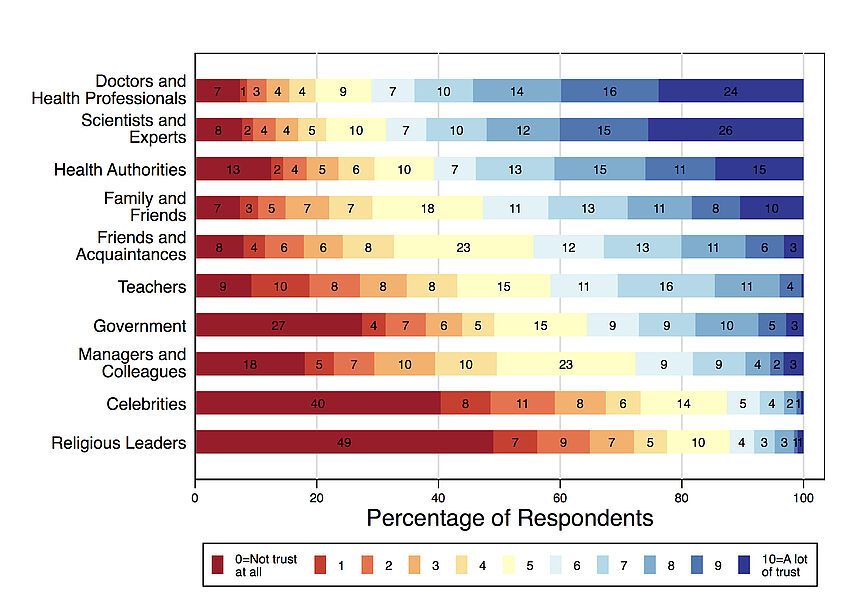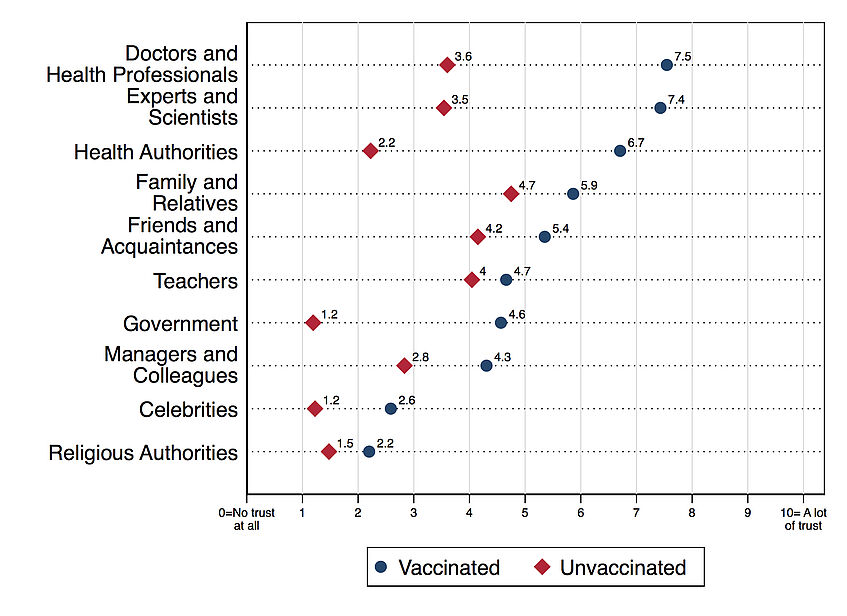03.02.2022 - PDF
Information on vaccination: Who do Austrians trust?
- The groups that Austrians trust the most with information regarding COVID-19 vaccinations are health professionals, scientists, and other experts. The least trusted are celebrities and religious authorities.
- Comparing vaccinated and unvaccinated people, unvaccinated respondents have less trust in all of the groups than vaccinated ones.
- Unvaccinated people are most likely to trust family and relatives, friends and acquaintances, as well as teachers.
By Jakob-Moritz Eberl and Barbara Prainsack
Since February 2022, vaccination against COVID-19 is mandatory for Austrian residents aged 18 and over. But those who fail to comply with the mandate will not be penalised in the immediate future, and public authorities are still seeking to convince as many people as possible to get vaccinated out of their own free will.
But who can convince people to get vaccinated - if anyone? To address this question, the Austrian Corona Panel Project (ACPP) asked a (representative) sample of around 1,500 people aged 14 and older who they trust when it comes to information on vaccinations against COVID-19. Respondents were asked about specific groups and could indicate their level of trust ranging from 0 "no trust at all" to 10 "a lot of trust".
Who do Austrians trust with information on vaccinations against COVID-19?
Figure 1 shows whom Austrians trust the most in this context. Overall, doctors and other health professionals are the most trusted group: 71% of our respondents chose a scale point above the middle category (5), and almost a quarter has "a lot of trust" in this group. Almost as trusted as doctors and health professionals are scientists and other experts, with 70% of respondents choosing a scale point above the middle category. Health authorities (61%), family and relatives (53%), friends and acquaintances (45%), teachers (42%), the federal government (36%), as well as line managers and work colleagues (27%) are placed in the middle. The federal government stands out with a comparatively larger share of respondents who selected the answer option (0) "no trust at all" (27%). Overall, the least trusted groups are celebrities and religious leaders (approx. 12% each).
In Naught We Trust? Unvaccinated people have less trust in information from all groups
Figure 2 shows the average level of trust by group of people and vaccination status of the respondents. One result immediately stands out: unvaccinated people trust information from all groups of people less than vaccinated people. While the difference for religious leaders (vaccinated respondents answered with an average of 2.2 and unvaccinated respondents with 1.5) and teachers (vaccinated Ø4.7 / unvaccinated Ø4) is relatively small, there are large differences between vaccinated and unvaccinated respondents especially regarding their trust in health authorities (a difference of 4.5 scale points). Similarly, large differences exist regarding trust in experts and scientists as well as doctors and health personnel (a difference of 3.9 scale points in each case) and regarding trust in the federal government (difference of 3.4 scale points between vaccinated and unvaccinated respondents).
While unvaccinated people have less trust in information from all groups (and especially, but not only, those that publicly promote vaccination), the group that they are most likely to trust are family and relatives, friends and acquaintances, and teachers.
Conclusion
Despite recent reports of the high skepticism of Austrians regarding science and technologies, when it comes to information on vaccination against COVID-19, most place great trust in established authorities such as health professionals, health authorities, scientists, and other experts. But there are clear differences between vaccinated and unvaccinated people: The latter have very little trust in precisely these groups, and also in the federal government. They are most likely to trust family members and relatives, people in their circle of friends and acquaintances, and teachers.
Our results suggest that official vaccination campaigns - especially those that rely on communication and information from the federal government, established experts, or health authorities - are unlikely to change the minds of those that are still unvaccinated at this point. There could be some potential within the social circle of unvaccinated individuals to motivate them to get vaccinated - but this is not a lever that public authorities can easily use. The relatively high level of trust that unvaccinated people have in teachers suggests that efforts to reach especially younger cohorts should involve this group.
Jakob-Moritz Eberl ist seit April 2017 Projektmitarbeiter (Post-Doc) am Institut für Publizistik- und Kommunikationswissenschaft und assoziierter Wissenschafter im Vienna Center for Electoral Research (VieCER) und des Projektteams des Austrian Corona Panel Projects (ACPP) und beschäftigt sich unter anderem mit Fragen zu Medienwirkung, Medienvertrauen und Wahlverhalten.
Barbara Prainsack ist Leiterin des Instituts für Politikwissenschaft an der Universität Wien, und neben ihrer Mitwirkung im ACCP auch Leiterin der multinationalen Studie “Solidarität zu Zeiten einer Pandemie” (SolPan). Ihr neues Buch The Pandemic Within: Policy Making for a Better World (mit H. Wagenaar) erschien im Oktober 2021 bei Bristol University Press.
Verwandte Beiträge
- Blog 126 - Land der unterschiedlichen Impfgeschwindigkeiten
- Blog 127 - Warum sich manche (noch) nicht impfen lassen: Besorgnis um Nebenwirkungen, mittelmäßige Informiertheit, Zweifel am Nutzen
- Blog 128 – Impfbereitschaft: Wer sind die Zögerlichen?
- Blog 129 - Impfbereitschaft, impfpolitische Maßnahmen und Kinderimpfung
- Blog 131 - Das 7C-Modell zur Erklärung der (mangelnden) Impfbereitschaft
- Blog 132 - Impfbereitschaft und Einstellungen zu Corona-Maßnahmen
- Blog 133 - Warten auf andere Impfstoffe


